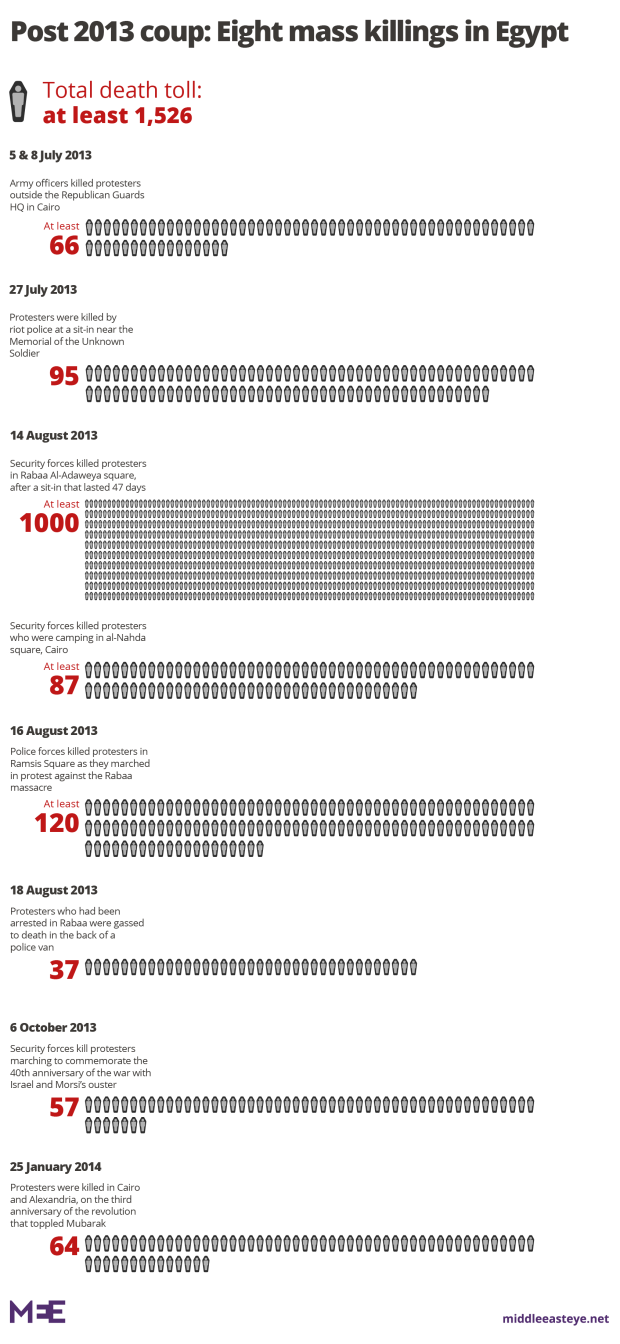Five years ago, Egypt witnessed the Rabaa massacre, often described as the end of the Arab Spring.
On 14 August, 2013, Egyptian security forces conducted a brutal operation to clear thousands of protesters, killing at least 1,000.
Many call it the worst mass killing of demonstrators in modern history, with its death toll surpassing the Tiananmen Square massacre in China in 1989 and the Andijan massacre in Uzbekistan in 2005.
What led to Rabaa?
On 30 June 2012, in the aftermath of the pro-democracy 2011 Egyptian revolution, Mohamed Morsi, the chairman of the Freedom and Justice Party and high-ranking Muslim Brotherhood member, became the first freely-elected civilian president in Egypt’s modern history.
Morsi’s tenure was short-lived, however. Exactly a year after his election victory, Morsi's opponents staged nationwide protests, blaming him and his party for the deteriorating economic and political situation the country was in.
The protests were backed by the army, and on 3 July, 2013 Morsi was deposed by a military coup by his defence minister, Abdel Fattah el-Sisi, who is now president.
In response, Morsi's supporters and critics of the coup, including Muslim Brotherhood members and pro-democracy civilians, staged nationwide protests demanding he be reinstated and a return to democracy.
The largest sit-in was held in Rabaa al-Adaweya Square in the northern Cairo district of Nasr City. Some 85,000 protesters camped there for six weeks until they were violently dispersed, in what became known as the Rabaa massacre.
Was Rabaa the only massacre?
All major protests demanding Morsi's reinstatement were crushed by brutal force.
In July and August 2013, five separate mass killings took place, as Egyptian security forces killed at least 1,150 protesters in what were widely considered crimes against humanity. Investigations by independent rights groups reported that the killings were intentional and systematic.
Who were the protesters?
Estimated to be nearly 85,000 people strong, protesters at the Rabaa sit-in were overwhelmingly peaceful, middle-class Egyptians. Many were said to be members of the Muslim Brotherhood, but many others were non-partisan civilians opposed to the coup. They included women, children and elderly people.
What happened in Rabaa?
Egyptian authorities promised a gradual dispersal of the protest, and said they would provide safe exits for people to leave the square.
The actual dispersal, however, was the opposite of that. In the span of 12 hours, from sunrise to sunset, security forces fired live ammunition on large crowds of protesters in intense fusillades.
The security forces used armoured personnel carriers (APCs), bulldozers, ground forces and snipers. They were covered by army tanks deployed outside the square.
Then-Interior Minister Mohamed Ibrahim later admitted in a TV interview that he had anticipated at least 2,000 fatalities among the protesters during the dispersal. This was echoed by then-Prime Minister Hazem Beblawi, who also said in an interview with the press that “the final outcome was less that we expected”.
The square was besieged for most of the day. Attacks were carried out from all the five entrances to the square, making it lethal for trapped protesters to try and leave the square or for the wounded to be transported to hospitals. Many of those who tried to escape were shot dead.
Most of the casualties were shot in the head, neck or chest.
Towards the end of the operation, security forces advanced towards the mosque and hospital in the centre of the square and asked the volunteer medics present to leave the wounded behind and exit the square. Then they set fire to the mosque and hospital, including the corpses of those killed and the wounded protesters who were still alive.
Evidence documented by independent rights groups suggests that most of the security forces' fire targeted crowds of unarmed protesters, which led to the high number of casualties.
Who were the victims?
Around 1,000 protesters are estimated to have been killed on that day. They included at least 30 children and 19 women, most killed by bullets to the head or chest.
Security forces detained 800 protesters over the course of the day, and summarily executed many of them.
Several journalists were killed while covering the event, including British Sky News cameraman Mick Deane, and two Al Jazeera cameramen.
Although the protesters were largely peaceful, the official Forensic Medical Authority said eight police officers were killed on that day.
Who was behind the operation?
The Rabaa operation was carried out by the interior ministry, then led by Ibrahim, and supervised by Sisi, who was defence minister and deputy prime minister for security affairs. The commander of police forces on that day was General Medhat Menshawy.
Was anyone prosecuted?
Yes, the surviving protesters. Not a single official was held accountable for Rabaa massacre. Menshawy, who was in charge of carrying out the operation, was later promoted to assistant minister of interior for central security. All officers who participated in the sit-in were given a bonus in recognition of their efforts. Sisi became president in June 2014.
On 3 July 2018, marking the fifth anniversary of the coup, the Egyptian parliament approved a law that exempts senior army officers from prosecution for any acts committed since July 2013. That includes Rabaa and seven other mass killings.
Nearly 1,000 protesters were prosecuted and many of them received life sentences and death sentences for their role in the demonstrations that followed the 2013 coup.
How did the world react?
The European Union and the United States condemned the killings, but later carried on business as usual with the Sisi government. The EU suspended its export of military equipment to Egypt after the massacre, but allowed individual states to continue to supply Egypt with weapons.
The US withheld part of its military aid in 2013 and 2017 but then released it, triggering accusations that it gave Sisi a "green light for repression”. Similarly, the UK, Egypt’s largest trade partner, revoked some arms export licences after the massacre, but arms sales later resumed.









